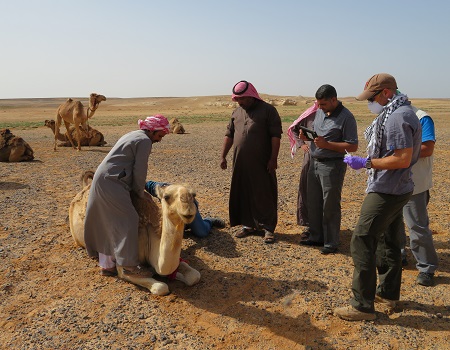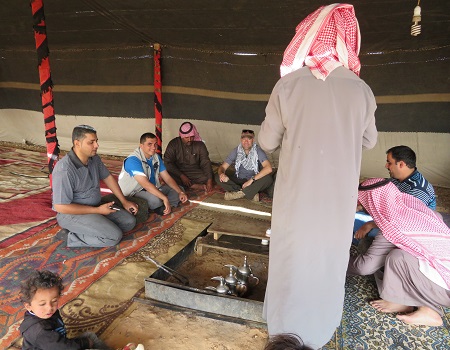
NIAID MERS-CoV work
in Jordan
NIAID Now | January 03, 2018

Credit: NIAID
NIAID’s Neeltje van Doremalen, in yellow, trains Jordanian health care workers on classic diagnostic procedures for MERS.
International field work typically presents new challenges to scientists each time they venture away from their home lab – can they adjust to the climate and native language? Add war and global disease to the hurdles that a NIAID group had to clear in establishing research sites in Jordan to study Middle East respiratory syndrome coronavirus (MERS-CoV).
MERS-CoV emerged in Saudi Arabia in 2012 and within weeks, researchers at NIAID’s Rocky Mountain Laboratories were studying the virus at its facility in Hamilton, Mont. Since then, the outbreak has spread to 27 countries and sickened more than 2,000 people, about 35 percent of whom died, according to the World Health Organization. Most people with MERS-CoV infection have severe acute respiratory illness with symptoms of fever, cough and shortness of breath, according to the Centers for Disease Control and Prevention.

Credit: NIAID
NIAID’s Dr. Vincent Munster swabs the nose of a dromedary camel to test the sample for MERS coronavirus.
The mission resumed in 2014 but was once again halted when the NIAID team was called on to diagnose Ebola cases during the outbreak in Liberia.
Subsequent trips have gone as planned, and today Dr. Munster’s team of about a half-dozen researchers has helped improve MERS research and diagnostic capabilities in multiple Jordanian health facilities. The efforts are being done in collaboration with local researchers at the Jordanian University of Science and Technology in Irbid, Kansas State University, and the Royal Veterinary College in London.
The groups are hoping to learn how MERS is transmitted from dromedary camels to people such as Bedouins – nomadic desert dwellers who are in close contact with camels and other domestic livestock. The research team has established a questionnaire for smart phones it hopes will help reveal risk factors for Bedouins and others in the region of becoming infected with MERS, rabies, brucellosis and other diseases transmitted to people by animals.

Credit: NIAID
The research team prepares to gather samples from a dromedary camel.

Credit: NIAID
NIAID’s Dr. Vincent Munster, far side of the tent wearing a white scarf, enjoys some Bedouin hospitality—drinking Turkish coffee.





















.jpg)









No hay comentarios:
Publicar un comentario